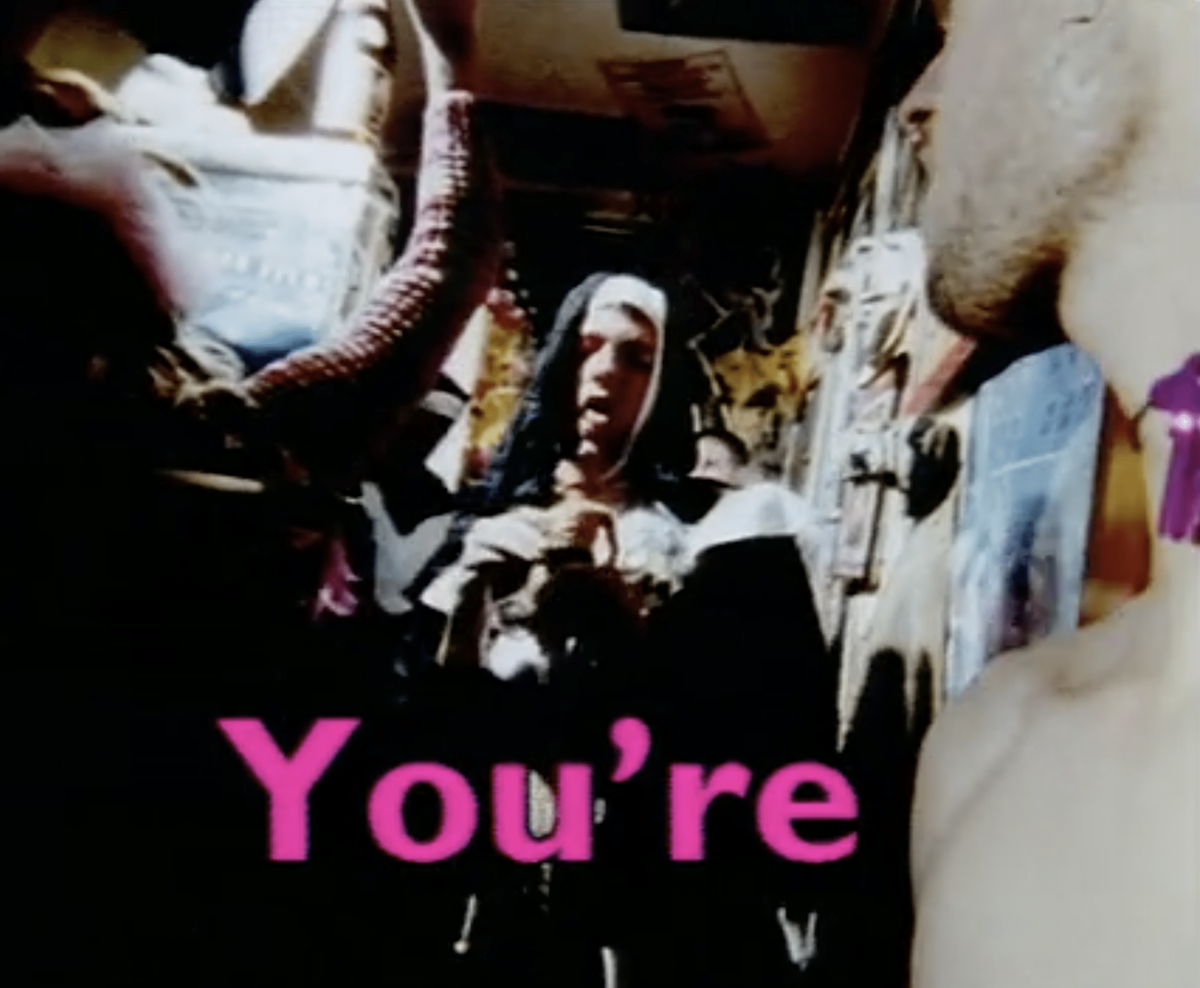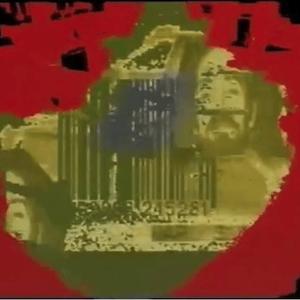Programme One: Deflowering Films, July 21
It was a big of a long shot, after delving into the mysteries of Asian philosophy all week, pondering the finer points of Being and Nothingness, to turn up early at a definitively post-punk event hoping for further enlightenment. Quite the opposite. A few of us milled around in the sub-basement lobby before entering the screening room a few minutes before the show was due to begin. There was, however, no sign of the talent, Brent Hayward/Fats White/Phats Blanco or whichever incarnation he may turn up as this night. To tell the truth, and going by his crazed appearance on TV3’s Nightline the previous day, it was a bit of a relief. Even the interviewer had opened his clip with:
"I’ve been dreading this all week."
Still, at only $5.00 entry it promised a more affordable and lively offering than the second night of the NZ Film Festival taking place further down the road, or the football match on TV. Eventually Brent turned up, babe in tow, dressed as a patchwork red tartan techno Mohican, telling us that he had to go to the toilet but not to worry because it was,
"Only for a piss, not a shit."
Given what was to unfold onscreen over the next hour it was an apt introduction. For we were to see all manner and size of genitalia and orifices in close up and long shot in various states of relationship with one another. These included, but were not limited to, penetration, ejaculation, masturbation and plain old everyday cock boxing. All within a wider context of same and cross-gender sexuality and violence and later, even a touch of environmentalism.
Hayward strode back into the screening room, said he had to do a sound check and ordered everyone out, checking random viewers to make sure that they had paid their admission fee. We demurely filed back out into the anteroom and milled about some more till Brent ordered us back in. His manner implied that we, the audience, had done something wrong.
All of this domination, exhibiting none of the smooth patina of Hollywood celebrity, academia nor even the local art scene was beginning to piss me off. I pondered whether to divert my energies into either an act of transcendental levitation or, more simply, just beat the crap out of the guy and steal his girlfriend. Luckily, an Om-like Supreme Nothingness won out on the night.
Once we were reseated Brent explained that he was a bit on edge for the screening because every time he showed his films in the southern hemisphere something bad happened. Reference, of course, to his previous arrests for offensive or pornographic acts and representations. The audience looked nervously around the room at one another. And then we were into Manawanui (1996).
Manawanui (1996) Brent Hayward
Describing himself as a great Kiwi patriot, Hayward spoke between each of his intense, grainy, no budget short films. In a stuttering, elliptical delivery he told us that Manawanui had won a major cash prize at the My Queer Career Film Festival in Australia and that Slick (1989) had been widely and successfully screened across North America and Europe in the 1990s by the German curator Jurgen Bruning.
He said that in works like Slick, being dedicated to all that is forbidden, he thought of himself as working as an archaeologist, digging around at unseen things that are going on just beneath the surface of society.
We heard he had religiously eaten onions every day for 6 months in order to record his flatulence in 90 minutes of stereo sound on a Pro Walkman. This was later edited down into the soundtrack for Rim (1991).
As the programme proceeded through works such as Ward 9C at 3am, Mondobiko, Gun Play, Off The Tracks, A flea on God’s Arse, Uranium Folk Film, Blind Creek Willy and Horsenam the good natured audience responded with catcalls like,
"You’re a legend, Brent."
No doubt about it and, to which I would add, Hayward has got balls and he’s not afraid to show them.
Programme Two: Fifth Column Films, July 28
On arriving early at the second Mondo Feasto screening I mentioned to Zoe Drayton, the director of the Audio Foundation, that the demise of the Moving Image Centre seems to have opened a door for experimental film screenings in Auckland. By September this year alone there would have been at least twelve events, ranging from the Snake Pit’s Micro-Cinema series, to Roger Horrocks’ Len Lye: The Opera at the Maidment, an Expanded Cinema experience in early August right through to the inclusion of some experimental films in the annual Auckland Film Festival. It is a sign of re-emergent health that work is again being lit up on independent screens now that the impediment presented by the MIC has gone.
How refreshing to see a local artist willing to ingest from the very cesspool of life in order to have it erupt out of him as a boiling larval flow from a diseased and disordered world. An artist such as Brent Hayward. As he said at his screening,
"I was down with the Mongrel Mob for
a while. They liked it rough. I gave
it to them special."
And,
"This is made downtown. I like downtown."
His is indeed the type of work that can be readily found in downtown New York, Toronto or Berlin. It is unique and special that Hayward, a truly self-invented artist, independently came up with such work here, borne from a raw urban underbelly.
The event was as high spirited and good natured as it had been the previous week with free flowing exchanges between Hayward, as D.J. Manners, and his appreciative audience. Adorned with patches of black electrical tape he announced,
"I don’t want to keep you guys up too
late because I know you’ve got church
in the morning."
He opened with Rugger Buggers (1999), a speculation on All Black sexuality. Next, it was his earlier incarnation as Smelly Feet performing Fruit and Veges on High Street in the early 1980s,
"No one wants the used ones
No one wants the bruised ones."
The journey through his musical life continued with Norma Jean Blues (2008) and Audio Slut (2007) both shot on Cross Street behind Karangahape Road and the hilarious Kill City outside St Kevins Arcade with dancing pedestrians,
"I might have had some magic mushrooms."
It was around this time that Hayward began clambering back and forth over empty chairs in order to avoid the projector beam casting his shadow onto the screen.
The films took on a darker turn with Domestic Blitz (1999), his singular account of domestic violence and child abuse in New Zealand followed by a re-edited (2011) version of the powerful Confessions of Johnny Barcode - born from a test tube into a world in which thuggish violence and voodoo economics are inextricably linked.
The Everyman (1999) is Hayward’s televangic sermon, from around the time of the Reverend Stinkfinger, to the marginalized and dispossessed set to images of butts, Buddhas and gun toting strangers. Originally made as a moving image backdrop for a performance involving about 50 people it was here shown to the accompaniment of D.J. Manner’s patter, live sound mixing, and audience interjections.
All in all, these were two marvellous events at which Hayward accounted himself very well as a candid and genial host with a distinctive working class expression.
Thanks to Brent Hayward for the permission to include Manawanui in this article.
Archival footage (Manawanui) from material preserved and made available by The New Zealand Film Archive Ngā Kaitiaki O Ngā Taonga Whitiāhua.
-180_0.jpg)

